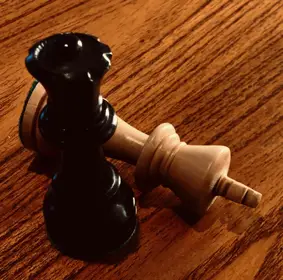Chess
I am a keen if mediocre chess player.
I first started playing when I was about ten. I was taught by father and was given a small book on it. My neext-door neighbour had a games collection, and I remember being stuck by the romantic names of the openings; "Cambridge Springs Variation" sticks in my mind. I became pretty obsessed. I played throughout my school years, playing for the school team. I peaked when I was 18, reaching a ELO grade equivalent of 1818. I even won a few pounds at some local Hampshire tournaments (most improved young player in Hampshire, and best blitz performance under 18, I think; £10 each).
From then it was downhill. I contined to play at Cambridge, but lost interest while doing my PhD.
I started again around 2000 (I am very prone to sudden enthusiasms). I played for my local side, Perth, but although I became more or less competent, I never regained my early heights. The world had moved on. I remember at a tournament I played my customary 1...Nf6 expecting a King's Indian and my opponent wheeled out what I later discovered was the Trompowsky. WTF? I remember very clearly thinking. I lost. The Internet Chess Club was in its infancy, and I played online games too - always risky with a dial-up modem in the country. I became Head of Department, we moved house, and I gave up again.
My enthusiams revolved again and in 2020 I became very keen again. Just as I was starting on the conference circuit Covid came along. I play entirely online now, at Lichess, with my current goal to beat the 1800 barrier in slow games. I know it is easy to be too obsessed with ratings, but they are good guides to our level of progress. It is always good to have an external measure of ability.
One of my failings is that I start to calculate too early, both in tactics puzzles and in games. I need to evaluate before I calculate, every move. Now doing that might be harder than it sounds because I do have this tendency to rush in with what I think is obviously the best move. I think if I an overcome this hurdle I will improve. It's difficult because the behaviour is linked to my personality, and being very impulsive and having ADHD. Related to this point, I have always made careless errors in everything I do (mentioned in a school report aged 8), and the same applies to chess. Chess is as much a battle against ourselves as our opponent.
One thing I just do not understand about modern chess, particularly online, is cheating. Few things seem more pointless.
Blogs
I have written some guest blogs on chess and psychology:
On chess and ageing, at Chessable.
On how to avoid playing too slowly, at chess.com.
Chess improvement
And here is a link to my current chess self-improvement plan.
There are of course many other, much larger sites dedicated to chess. I particularly recommend that of Dan Heisman, who has written the wisest words I know for the average amateur player. I agree with everything he says; my problem is in applying it every move. If I could it would lead to substantial improvement.
Psychology of chess playing
Chess is an interesting skill from a psychological point of view because playing it and improving at it exemplifies many of the characteristics of skill acquisition and skilled performance. It is no coincidence that many of the most important studies of skill acquisition have been on chess and chess players (see for example the work of De Groot).
Playing chess well particularly involves meta-cognition - our ability to think about our own mental abilities and skills, and one of my psychological research interests. Good play demands a good thinking process. I know what I should be doing, but I sometimes have great difficulty in doing what I know.
